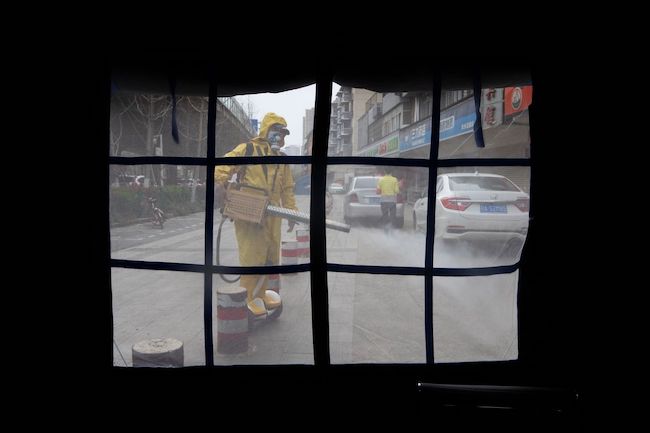
A volunteer disinfects a residental area amid the COVID-19 coronavirus outbreak in Wuhan in Chinaís central Hubei province on March 16, 2020.
Photograph by AFP via Getty Images
We have yet to see how many open societies accept or resist Chinese-style quarantine measures to protect their citizens from the spread of Covid-19. Because of its enormous size and the geographical spread of the virus, China has locked down numerous strategic locations.
But "lockdown" and "quarantine" are relative terms, it turns out. If you really want a definition of quarantine in China, good luck. Variations exist among provinces, cities, neighborhoods, and even residential buildings. In the end, they depend on the tenacity of the buildingís enforcer, and the method of monitoring the health of quarantine residents varies.
Some compounds have walled off all but one main exit to prevent escapees. At others, people can come and go without being checked. Knowing "the door guy" can help with ease of access.
At the extreme, residents in most of Hubei province have been forced to stay inside for more than a month.
Then there are mandatory hotel quarantines for new arrivals to China. One Chinese-born student, Tianyu Fang, is unsure if he will graduate from his Boston boarding school this year, so he returned to China to see his parents. He says he escaped the mandatory hotel quarantine Beijing rolled out Monday that uses airport shuttle buses to transport new arrivals to a nearby hotel for a 14-day isolation. Just hours before such stricter quarantines measures went into effect, he arrived and was able to celebrate his 19th birthday locked down in Beijing with his parents.
Fang said a Chinese friend arriving from the U.S. wasnít as lucky regarding a hotel quarantine, and now has to live for 14 days in a government-designated hotel in Beijing, which now requires guests to pay for themselves. The tab runs about 600 yuan ($86) per day.
China is miles ahead of most countries in digital payments and online food and grocery ordering, which has eased the burden of isolation somewhat. These services have remained a lifeline as the country remained locked indoors, with couriers bringing meals, produce, and packages and leaving them at the ad hoc "shelves" placed at the main gates of compounds.
Most authorities in Chinaís cities use digital-thermometer guns to quickly gauge the temperature of anyone attempting to enter a public facility, from apartments to restaurants to shops. Next, people show a card given to them after completing quarantine. "I can freely leave my apartment, but can return only with a little stamped card that says Iím not sick," said Sichuan resident Wu Haoran.
A handful of restaurants are open, but customers are rare and registration and temperature scanning are required. Starbucks (ticker: SBUX) allows only five customers at a given time and features "touch-free" ordering."
Most Chinese have strictly obeyed their mandates to quarantine and later take precautions while outside. At the peak of the outbreak, numerous videos on Chinese social media showed people being dragged into vehicles for refusing to submit to health checks. Things have calmed down, but rigorous measurements to safeguard and separate people remain in place.
Tanner Brown is a writer for Barronís and MarketWatch and producer of the Caixin-Sinica Business Brief.
By Tanner Brown
LINK: https://www.ansarpress.com/english/14916
TAGS:






























 Violation of the sovereignty and rights of afghan citizens by America
Violation of the sovereignty and rights of afghan citizens by America




